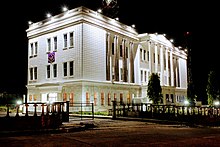Masonic Order of Liberia
| Part of a series on |
| Freemasonry |
|---|
 |
The
History
Expansion and political dominance

The Grand Lodge of Liberia was founded in 1867.[1] By the 1970s there were 17 subordinate lodges and the majority of Liberia's high-ranking officials were Masons.[1] Matters of state were widely believed to have been decided from within the lodges.[1] Being a Mason was a veritable prerequisite for positions of political leadership in the True Whig Party.[1] Liberia's Masons were criticized for their influence as well as for the exclusion of indigenous Liberians from their ranks.[1]
Prohibition and reinstatement
In 1990, Samuel Doe in turn was murdered by Prince Johnson, one time ally of Charles Taylor, in an internationally televised display. To prove that Doe was not protected by black magic, his ears were cut off, then some of his fingers and toes, and finally he was murdered by decapitation and buried (his body was later exhumed and reburied). The spectacle of his torture was videotaped and seen on news reports around the world. The video shows Johnson sipping a beer and being fanned by an assistant as Doe's ear is cut off.
During and after the civil war
This section needs to be updated. (September 2022) |

During the
The Masons evicted squatters from the Grand Lodge by 2005,[5] and the Masonic Temple has resumed to hold meetings for the subordinate Lodges in the Blue Lodge Room, quarterly Grand Communications in the Grand Lodge room as well as meetings for the Order of Eastern Star and its subordinate Chapters in their respective rooms within the Temple. According to the Grand Lodge's 2015 reports, there are 19 Subordinate Lodges in Liberia with a total membership of 1,750.[7] Benoni Urey, a Freemason who is considered Liberia’s richest man and a possible candidate for the Liberian presidency, has said he wants to see the Masonic Order of Liberia return to prominence in Liberian politics.[8]
References
- ^ a b c d e Monrovia – Masonic Grand Lodge
- ^ Wauther, Claude (September 1997). "A strange inheritance". Monde Diplo. Retrieved 13 June 2015.
- ^ a b The Tragic History of Freemasonry in Liberia, Chris Hodapp, Freemasonry for Dummies Blog
- ^ Old Ruling Elite Making a Comeback in Liberia, Tim Sullivan, Associated Press, September 29, 2001.
- ^ Frontline (PBS), May 2005.
- ^ Hodapp, Chris (29 June 2015). "The Tragic History of Freemasonry in Liberia". freemasonsfordummies.blogspot.com. Retrieved 13 October 2015.
- ^ "Grand Lodge of Liberia A.F.& A.M." Grand Lodge of Liberia. Archived from the original on 6 December 2015. Retrieved 12 October 2015.
- ^ Yates, Charles (29 June 2015). "Presidential Candidate Urey Wants Freemasons to Control Liberian Politics". Bushchicken.com. Retrieved 13 October 2015.
